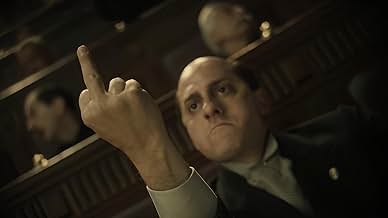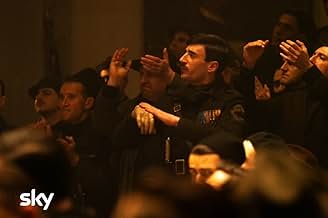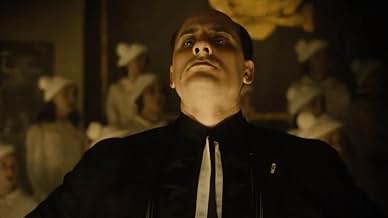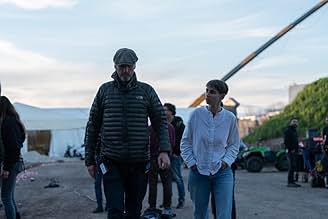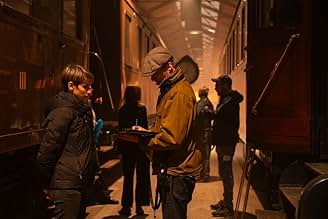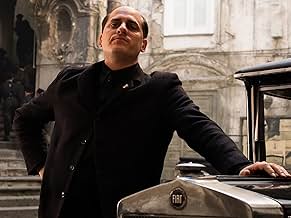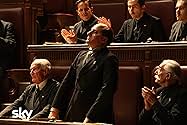Narra a ascensão ao poder do ditador italiano Benito Mussolini em uma história de um país que se rendeu à ditadura.Narra a ascensão ao poder do ditador italiano Benito Mussolini em uma história de um país que se rendeu à ditadura.Narra a ascensão ao poder do ditador italiano Benito Mussolini em uma história de um país que se rendeu à ditadura.
- Prêmios
- 2 vitórias no total
Explorar episódios
Avaliações em destaque
I mainly focus on the film aspects. Without getting too deep into it, I try to gauge how much truth versus mystification is presented. I don't align with either the right or the left.
This series is one of the most beautiful I have seen in recent times. Mussolini's dialogue with the camera is pure gold. The way he conveys his thoughts, mocks the viewer, and shares his confessions keeps you glued to the screen and makes you feel involved in the story. Marinelli is fantastic! Those who criticize him likely do so for reasons unrelated to his performance. Francesco Russo is superb, and Barbara Chichiarelli is perfect!
This series is one of the most beautiful I have seen in recent times. Mussolini's dialogue with the camera is pure gold. The way he conveys his thoughts, mocks the viewer, and shares his confessions keeps you glued to the screen and makes you feel involved in the story. Marinelli is fantastic! Those who criticize him likely do so for reasons unrelated to his performance. Francesco Russo is superb, and Barbara Chichiarelli is perfect!
A solid recommendation from me. I really enjoyed the flow, acting, action, and storytelling. I always find it fascinating how such a destructive force can rise to power-what forces support it, oppose it, and which ones get swayed, and why. The quality of the series is excellent. For me, it belongs in the same league as Der Untergang and Unsere Mütter, unsere Väter.
What makes this series particularly compelling is its exploration of the political landscape in Italy at the time. The power struggles between the socialists, the monarchy, and other factions add layers of intrigue, showing how different forces either resisted or enabled the rise of authoritarianism. The shifting allegiances and moral dilemmas make for gripping storytelling.
On top of that, the action sequences are intense and well-executed. The battles, street clashes, and political confrontations feel raw and realistic, adding weight to the historical events. The choreography, cinematography, and pacing of these scenes keep the tension high, making it a visually and emotionally engaging experience.
What makes this series particularly compelling is its exploration of the political landscape in Italy at the time. The power struggles between the socialists, the monarchy, and other factions add layers of intrigue, showing how different forces either resisted or enabled the rise of authoritarianism. The shifting allegiances and moral dilemmas make for gripping storytelling.
On top of that, the action sequences are intense and well-executed. The battles, street clashes, and political confrontations feel raw and realistic, adding weight to the historical events. The choreography, cinematography, and pacing of these scenes keep the tension high, making it a visually and emotionally engaging experience.
For those who have any interest in history, politics, and lessons on human nature, this is the show for you. Seeing the rise of Mussolini in such a way - with Luca Marinelli frequently breaking the fourth wall to speak to us, his audience - keeps it captivating and really holds up to the meta spectacle of his character. Despite the seriousness of the topic, the biting sarcasm and amusing moments keep it entertaining, too. Of course, for anyone who's been following the recent global rise in certain political trends, they'll undoubtedly feel a little uneasy when recognizing the patterns in today's day and age. An impressive production, Luca Marinelli's portrayal of the famous Italian dictator is downright stupendous. A wholehearted recommendation to watch and be amazed by M - Son of the Century.
The film presents the beginnings of Benito Musollini's political career. But to a greater extent it is a study of the creation of a dictatorship. And this is a universal and timeless phenomenon.
What is unusual is the form, which may put off some viewers. The main character often speaks directly to the audience, presents his thoughts and comments on the events taking place, sometimes these allusions are current, e.g. In episode four when he says the slogan MIGA (you will understand when you see it). It is a really great scene.
The film is also quite baroque, at times surreal.
The acting makes a great impression. Luca Marinelli (Musollini) behaves on screen like his prototype. If you know the history and have seen Mussolini's grotesque speeches, you can imagine that this required great skills. Other roles, although episodic, are also worth attention. For example, Benedetta Cimatti is great as the suppressed wife of the Duce.
Due to the specific form of the film, some viewers may be put off by it.
But it's a very good movie.
What is unusual is the form, which may put off some viewers. The main character often speaks directly to the audience, presents his thoughts and comments on the events taking place, sometimes these allusions are current, e.g. In episode four when he says the slogan MIGA (you will understand when you see it). It is a really great scene.
The film is also quite baroque, at times surreal.
The acting makes a great impression. Luca Marinelli (Musollini) behaves on screen like his prototype. If you know the history and have seen Mussolini's grotesque speeches, you can imagine that this required great skills. Other roles, although episodic, are also worth attention. For example, Benedetta Cimatti is great as the suppressed wife of the Duce.
Due to the specific form of the film, some viewers may be put off by it.
But it's a very good movie.
While the cinematography is out for everyone to appreciate, I feel a need to stress a couple of key points international audiences might miss.
First and foremost: the series is based on the first of four books about the life of Mussolini, and while they are routinely described as "novels", they are in fact impressively researched from a historical point. Pretty much every dialogue, speech, document and event are openly sourced and beyond question.
While the staging frequently and blatantly is not realistic in order to make the show more spectacular, pretty much everything happened as you see it - including a D'Annunzio's Japanese samurai secretary and other apparently absurd elements.
My second point is about the acting and language. While it will fly above the heads of anyone not _very_ experienced with Italian, the work behind regional accents, lapses into dialects and the very speech patterns of 100 years ago is exceptional indeed. It is a shame this will mostly go unnoticed, as it actually conveys a fair bit of refinement to an already stellar ensemble performance.
Lastly, the (not present in the books) stabs at current politics are far more varied than expected. Like, everyone can understand a sudden fourth-wall-breaking "Make Italy Great Again!", but you'll probably miss the reference to the catastrophic Berlusconi era (delivered via subtle voice and body acting, or even just a brief costume change), or to the sorry state of the last few recent Italian legislatures.
In short: come for the show, stay for the history lesson... and see it with an Italian resident if you can to enjoy it at its fullest.
First and foremost: the series is based on the first of four books about the life of Mussolini, and while they are routinely described as "novels", they are in fact impressively researched from a historical point. Pretty much every dialogue, speech, document and event are openly sourced and beyond question.
While the staging frequently and blatantly is not realistic in order to make the show more spectacular, pretty much everything happened as you see it - including a D'Annunzio's Japanese samurai secretary and other apparently absurd elements.
My second point is about the acting and language. While it will fly above the heads of anyone not _very_ experienced with Italian, the work behind regional accents, lapses into dialects and the very speech patterns of 100 years ago is exceptional indeed. It is a shame this will mostly go unnoticed, as it actually conveys a fair bit of refinement to an already stellar ensemble performance.
Lastly, the (not present in the books) stabs at current politics are far more varied than expected. Like, everyone can understand a sudden fourth-wall-breaking "Make Italy Great Again!", but you'll probably miss the reference to the catastrophic Berlusconi era (delivered via subtle voice and body acting, or even just a brief costume change), or to the sorry state of the last few recent Italian legislatures.
In short: come for the show, stay for the history lesson... and see it with an Italian resident if you can to enjoy it at its fullest.
Você sabia?
- CuriosidadesWhen Joe Wright got on board as director, at first he meant to have the actors say their lines in English. Then he changed his mind and chose to shoot the series in Italian, for a higher immediacy.
Principais escolhas
Faça login para avaliar e ver a lista de recomendações personalizadas
- How many seasons does Mussolini: Son of the Century have?Fornecido pela Alexa
Detalhes
- Data de lançamento
- Países de origem
- Central de atendimento oficial
- Idioma
- Também conhecido como
- Mussolini: Son of the Century
- Locações de filme
- Empresas de produção
- Consulte mais créditos da empresa na IMDbPro
- Tempo de duração
- 52 min
- Cor
Contribua para esta página
Sugerir uma alteração ou adicionar conteúdo ausente

![Assistir a Trailer Season 1 [OV]](https://m.media-amazon.com/images/M/MV5BYWM4MjYyMDktOWQwNy00NzNlLTg0OGUtZjk5Yzk0MjA2YmNlXkEyXkFqcGdeQXRyYW5zY29kZS13b3JrZmxvdw@@._V1_QL75_UX500_CR0)
